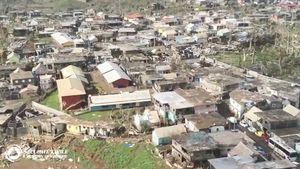Paulo Ricardo Santos da Silva, known as Paulão da Conceição, passed away on Sunday, October 15, at 65, due to multiple organ failure at the Instituto de Cardiologia, located in Porto Alegre. Paulão was recognized as the former leader of drug trafficking operations within the Vila Maria da Conceição neighborhood, part of the east zone of the city.
For several years, Paulão had been imprisoned for his involvement in serious criminal activities, including homicide and extensive drug trafficking. His legal troubles dated back to 1982, with over 62 criminal processes against him, making him one of the most notorious figures within law enforcement's radar. He had been sentenced to 28 years for the murder of Maicon Gilberto Silva, known as Nego Tico, committed back in July 2008.
The circumstances surrounding his death were linked to his deteriorated health condition, as he had been hospitalized for some time before passing. Despite being convicted, Paulão had been granted semi-open regime release multiple times due to health issues, which allowed him to remain outside of prison under certain conditions.
Paulão’s tumultuous life included numerous run-ins with the law. He was convicted not only for drug trafficking but also for various homicides, with one notable incident occurring within the walls of the Central Prison. Fleeing from his legal obligations was not unfamiliar to him; for example, he escaped during house arrest back in 2008 when he learned about impending law enforcement actions against him.
Throughout his lengthy criminal career, Paulão was linked to numerous violent events and high-profile arrests, indicating his influence and prominence within the drug trafficking scene of Porto Alegre. The police had classified him as the central figure behind drug distribution networks operating from the Vila Conceição area.
According to reports from Agencia RBS, “Paulão had an extensive criminal record, convicted of drug trafficking and homicides, one of which occurred inside the Central Prison.” His legal battles were numerous, including three convictions for homicide prior to facing the serious charges leading to his life sentence.
From the onset of his criminal activities, he was often associated with violence and largely recognized for his capacity to evade law enforcement, demonstrated when he escaped authorities even during medical concerns. His health issues resulted from longstanding conditions, which included heart problems, and he frequented medical facilities, remaining under the police's watchful eye.
Despite his legal troubles and criminal lifestyle, Paulão's influence over drug operations had significant implications for the city's safety and the lives of many involved. He was often reported to be at the center of violence surrounding drug disputes, creating waves of fear and instability within the areas he operated.
Known for his violent past, Paulão's criminal history painted a picture of someone who was deeply entrenched within the underworld of drug trafficking. His legacy is one marked by violence, crime, and the complicated nature of policing such figures—leading many officials to reflect on how to combat these deeply rooted issues.
Paulão's demise has sparked conversations around the effectiveness of the criminal justice system, especially when it concerns repeat offenders. Many wonder whether his health issues played too significant of a role in his repeated releases, with legal experts deliberated about the future of similar offenders.
The repercussions of his actions could still be felt throughout Porto Alegre as authorities continue to combat the drug trade influenced by networks he had previously controlled. Paulão da Conceição’s life and eventual death reflect broader challenges within society, the difficulties of rehabilitation, and the perpetual struggle against crime.
With law enforcement examining the impact of his life on the city over the years, Paulão stands as both a representation of criminal defiance and as a cautionary tale of the possible consequences of illicit lifestyles.



